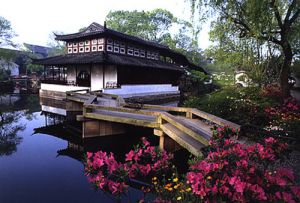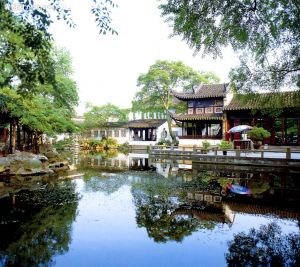Difference between revisions of "Classic Gardens in Suzhou"
imported>Graceshanshan (Created page with 'Suzhou in Jiangsu Province is a city of rivers and canals and also a city of gardens. Hence it is called the “Venice of the Orient”. The Ming and Qing dynasties between t...') |
imported>Ciic m |
||
| (11 intermediate revisions by one other user not shown) | |||
| Line 1: | Line 1: | ||
| − | Suzhou in [[Jiangsu Province]] is a city of rivers and canals and also a city of gardens. Hence it is called the “Venice of the Orient”. The Ming and Qing dynasties between the 14th and 20th century were its prime periods of garden building, when at one time there were more than 200 private family gardens. A dozen of them are still in good condition today, including the top four classic gardens – the Fisherman's Net Garden, Lion Grove, Humble Administrator's Garden and Lingering Garden. | + | [[Suzhou]] in [[Jiangsu Province]] is a city of rivers and canals and also a city of gardens. Hence it is called the “Venice of the Orient”. The [[Ming]] and [[Qing]] dynasties between the 14th and 20th century were its prime periods of garden building, when at one time there were more than 200 private family gardens. A dozen of them are still in good condition today, including the top four classic gardens – the [[Fisherman's Net Garden]], [[Lion Grove]], [[Humble Administrator's Garden]] and [[Lingering Garden]]. |
| − | The Humble Administrator's Garden, the largest, occupies four hectares. It was built in 1522 during the Ming Dynasty. Water accounts for three-fifths of its total area. All the major buildings face the water. Centering on the pool, bridges and corridors harmoniously link up isles, rockeries, pavilions and towers. The garden shows a natural and flowing artistic style. | + | [[File:zzy.jpg|thumb|left|Humble Administrator's Garden]]The Humble Administrator's Garden, the largest, occupies four hectares. It was built in 1522 during the Ming Dynasty. Water accounts for three-fifths of its total area. All the major buildings face the water. Centering on the pool, bridges and corridors harmoniously link up isles, rockeries, pavilions and towers. The garden shows a natural and flowing artistic style. |
| − | The Lingering Garden, on the other hand, demonstrates a compact layout and a delicate decorative art. Built in the Ming Dynasty, it was renovated and expanded in the early 19th century during the Qing Dynasty to cover an area of 3.3 hectares as we see it today. The garden is divided into four sections: artificial hills in the west, pastoral scenery in the north, hall and pavilion structures in the east and hills and waters at the center. A winding corridor of over 1,000 meters links them. | + | |
| + | The Lingering Garden, on the other hand, demonstrates a compact layout and a delicate decorative art. Built in the Ming Dynasty, it was renovated and expanded in the early 19th century during the Qing Dynasty to cover an area of 3.3 hectares as we see it today. The garden is divided into four sections: artificial hills in the west, pastoral scenery in the north, hall and pavilion structures in the east and hills and waters at the center. A winding corridor of over 1,000 meters links them.[[File:ly.jpg|thumb|left|Lingering Garden]] | ||
The unique charm of these gardens has led to their entry into the list of world cultural heritage in 1997. | The unique charm of these gardens has led to their entry into the list of world cultural heritage in 1997. | ||
| − | [[Category:World Heritage Sites | + | [[Category:World Heritage Sites]][[Category:Gardens]] |
Latest revision as of 02:59, 3 August 2009
Suzhou in Jiangsu Province is a city of rivers and canals and also a city of gardens. Hence it is called the “Venice of the Orient”. The Ming and Qing dynasties between the 14th and 20th century were its prime periods of garden building, when at one time there were more than 200 private family gardens. A dozen of them are still in good condition today, including the top four classic gardens – the Fisherman's Net Garden, Lion Grove, Humble Administrator's Garden and Lingering Garden.
The Humble Administrator's Garden, the largest, occupies four hectares. It was built in 1522 during the Ming Dynasty. Water accounts for three-fifths of its total area. All the major buildings face the water. Centering on the pool, bridges and corridors harmoniously link up isles, rockeries, pavilions and towers. The garden shows a natural and flowing artistic style.
The Lingering Garden, on the other hand, demonstrates a compact layout and a delicate decorative art. Built in the Ming Dynasty, it was renovated and expanded in the early 19th century during the Qing Dynasty to cover an area of 3.3 hectares as we see it today. The garden is divided into four sections: artificial hills in the west, pastoral scenery in the north, hall and pavilion structures in the east and hills and waters at the center. A winding corridor of over 1,000 meters links them.
The unique charm of these gardens has led to their entry into the list of world cultural heritage in 1997.

